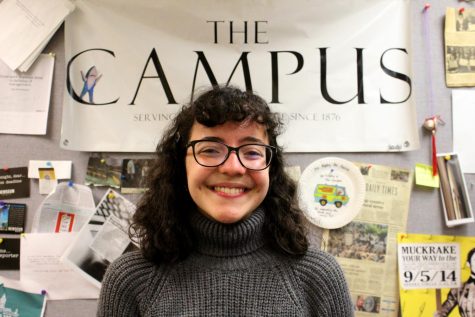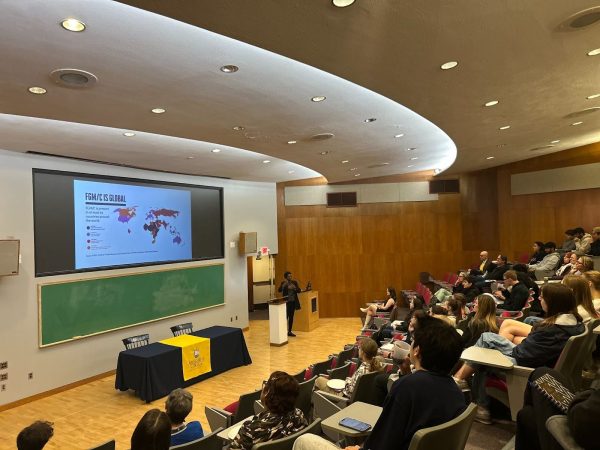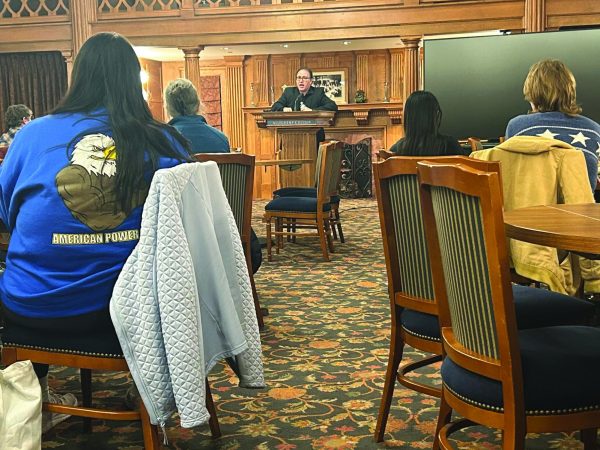Workshop series to teach students about financial literacy
According to a recent survey conducted by “Inside Higher Ed” and College Pulse, 77.5% of the undergraduate students who participated will face student loan debt after they graduate. Twenty percent are in the proverbial dark about exactly how much debt they will have accumulated. What is more, the majority of students who have an idea of what they will owe are scratching their heads when it comes to determining the approximate monthly payment.
These are grim statistics that point to a need for financial literacy education in college, perhaps in high school as well. However, But Allegheny is doing its part to familiarize its students with the basics of personal financial management. Out of a partnership between the Maytum Center for Student Success and the Bruce R. Thompson Center for Business and Economics has arisen the “Adulting 101” workshop series.
This is the third year such a series has taken place at Allegheny, with the first one occurring in 2019. The 2020 rendition was canceled due to COVID-19, and students attended the 2021 programming virtually. But this will be the first year that the series will have such a moniker.
Third- and Fourth-Year Class Dean Jonathon May explained that a group of seniors had approached the class deans during the spring 2022 semester and expressed a desire to have personal finance programming available for students, as they believed a gap existed in the course offerings. They thought other students could benefit from learning about the next steps after graduation, and what skills could be useful in getting there.
“In those meetings it was a graduating senior student back in May who said, ‘You know what? We need to have something like Adulting 101,’” May said. “And we all laughed, thinking, ‘Oh, what a silly name.’ But actually it’s become quite catchy.”
From conversations between students and class deans, it became apparent that personal finances was something students were particularly interested in acquiring more information about, which led to this workshop series.
Dean of Student Success Ian Binnington had referred May to CBE Co-Director and Entrepreneur in Residence Chris Allison, ’83, to further discuss the implementation of the programming during the summer. Allison pointed out that a personal finance program already exists at Allegheny, with two offerings: ECON-010, Financial Literacy; and a Financial Literacy Challenge hosted by the CBE at the end of each semester. Winners of this financial writing plan contest receive $10,000 in prize money.
“(As) part of that (competition) we always have workshops,” Allison said. “So we just decided, ‘Why don’t we use those workshops as our classes?’”
As Allison explained, financial literacy has a myriad of benefits. Those who are financially literate are educated on how to do personal budgeting, what tax withholdings will look like, and what they can expect their income to be, among other useful topics. Eventually, the workshop series will cover investing: stocks, bonds, the process of opening an investment account.
“I always joke with the students on our first class in financial literacy,” Allison said. “I (say), ‘Look, we could title this class “Life,” because you’re going to be dealing with these issues every month.’”
These workshops are occurring on select Thursdays this fall and early winter, in Quigley Hall Auditorium from 12:30 to 1:15 p.m. Lunch is provided. The first workshop in the series, on Sept. 29 — called “Managing Your Finances is Very Manageable” — taught attendees important financial terms and the significance of beginning one’s financial management journey early on. The next four workshops will cover income, budgeting for living expenses such as food and transportation, all things investing, and tying it all together in a personal financial plan, respectively.
Students are not required to attend all workshops, but if they do, they will get a completion certificate, which can be added to their resume.
Allison had been inspired to begin this financial literacy programming in part because upon graduating from Allegheny he did not have the skills taught in such a program.
“I was under the assumption that if you made your minimum payments on your credit card that that’s okay,” Allison said. “Little do you realize that the interest rates are really high.”
Another proponent of being knowledgeable in personal financial management at a comparatively young age is CBE Program Coordinator Beth Ryan, who began learning about all things financial literacy in her 40s, though she said she would have benefited from learning about it in her 20s. Not knowing how to navigate personal finances after graduation can lead to a snowball effect of issues later on.
“Because so many students are burdened in student loan debt, it’s delaying buying homes, problems buying cars, maybe not understanding (how to) build your credit,” Ryan said. “I hope all students take advantage of this (series) … it’s just good to have this basic training.”
All in all, the objective for the personal finance program at Allegheny — including the workshop series — is to ease student’s minds when it comes to learning how to be an independent, tax-paying, credit-card-payment-making adult after college.
“When the class starts, I always ask the class, ‘How many of you are nervous?’” Allison said. “And all the hands go up. I say, ‘Look, here’s what’s going to happen. By the end of the semester, you’re not going to be nervous anymore, because you can do it.’”

Sofia Hassan is a second-year student from New Castle, Pennsylvania. She plans to major in English Creative Writing and minor in Middle East and North...







